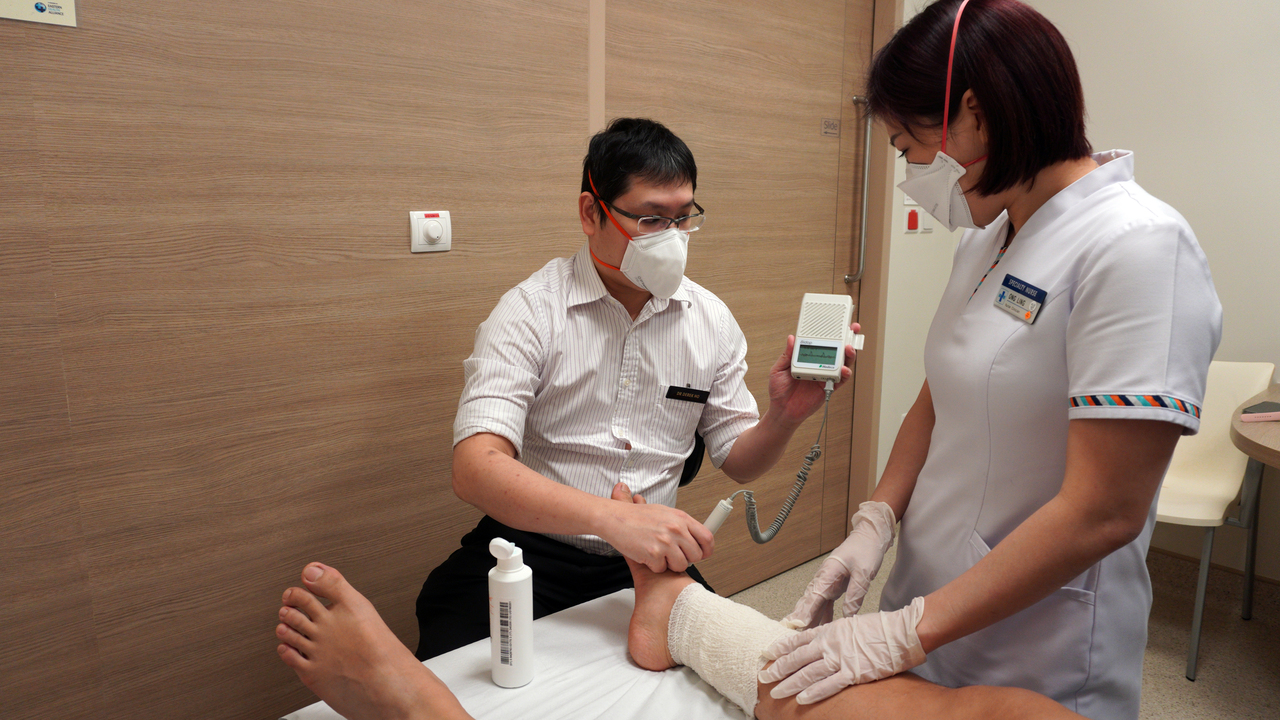CGH's wound healing centre speeds up access for treatment of chronic wounds
Sign up now: Get ST's newsletters delivered to your inbox

The Wound Healing Centre at Changi General Hospital is the first dedicated wound specialist centre in a public hospital.
PHOTO: CHANGI GENERAL HOSPITAL
SINGAPORE - Patients with chronic wounds can now take a quicker path to recovery at the Wound Healing Centre at Changi General Hospital (CGH).
The facility, which started operations in May, was officially opened on Wednesday (Dec 1) by Senior Minister of State for Health and Manpower Koh Poh Koon. It is the first dedicated wound specialist centre in a public hospital.
CGH noted that about one in 20 Singaporeans has chronic wound conditions - wounds that do not heal within four to six weeks. This is expected to increase in the coming years due to the ageing population and prevalence of diabetes.
The centre was set up to provide early intervention and outpatient treatment of chronic wounds.
Such wounds include diabetic foot ulcers and arterial ulcers, which are often a complication of underlying medical conditions. Smaller and hidden wounds also might not be detected until they become infected.
The centre offers patients access to wound specialists with backgrounds in orthopaedic, vascular, plastic, reconstructive and aesthetic surgery, as well as wound care nurses.
Patients can undergo diagnostic tests, assessments and treatment within the same day at the centre. After receiving a fast-track referral from polyclinics or emergency departments, they can be seen at the centre within two weeks.
Director of the Wound Healing Centre, Dr Derek Ho, who is also a vascular consultant at CGH's department of surgery, said that, typically, patients' treatment may be delayed as they get referred to different specialists.
"The waiting time for appointments can take up to two months. But at the centre, a full spectrum of wounds can be handled by our panel of specialists within two weeks.
"With earlier access to wound healing services, we aim to reduce unnecessary emergency department attendance, admission and surgery, which would translate to lower costs in the long run," he added.
If wound healing is delayed, it can lead to complications such as infections and gangrene that could require amputation. Gangrene occurs when body tissue dies due to a lack of blood flow or a serious bacterial infection.
About 200 amputations are done in CGH each year due to diabetes or peripheral vascular disease, which is a slow and progressive blood circulation disorder.
CGH chief executive Ng Wai Hoe said at the launch on Wednesday that detecting wounds early and getting them diagnosed and treated quickly are vital.
"We redefined care by designing a seamless one-stop care journey to provide easy, fast-tracked access and convenience to wound care sooner," he added.
"We encourage everyone with wounds which do not seem to heal, to seek medical attention... early so that we can help them have the best outcomes possible."
The centre provides an average of 1,000 wound-related consultations and procedures each month.
Mr Lee Kim Loon, 74, goes there three times a week to get his wound dressing changed after two of his toes were amputated due to gangrene. He has a history of diabetes, high cholesterol and high blood pressure.
His case is also reviewed by vascular and plastic surgeons during his visits.
Said Mr Lee: "My wounds are slowly healing and I have lost more than 10kg. I've also quit smoking for four months. I hope I can heal faster so I can go out to eat."
CGH also signed a memorandum of understanding with local biotechnology company Celligenics to conduct joint research and development in wound care solutions.
Wednesday's signing was witnessed by Dr Koh, SingHealth chairman Cheng Wai Keung and Celligenics chairman Koh Choon Hui.


